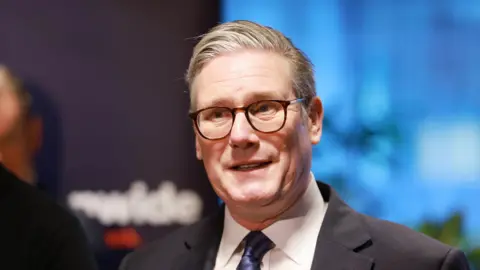UK will take calm approach to US tariffs, PM says
 PA Media
PA MediaThe UK will take a calm approach to US trade tariffs, rather than "a knee-jerk reaction," Sir Keir Starmer has said.
The prime minister suggested the UK would be affected by President Donald Trump's expected announcement on Wednesday of sweeping taxes on goods imported to the US.
The UK has so far failed to negotiate an exemption, but Sir Keir said talks on a deal that could eventually see them overturned were at an "advanced stage".
Sir Keir told his cabinet he was "keeping all options on the table" to respond to the tariffs, which economists have warned could damage the UK economy and increase the cost of living.
In the cabinet meeting on Tuesday, Chancellor Rachel Reeves said global tariffs would "have an impact on the UK as an open trading economy".
But she insisted "securing a deal could mitigate some of those effects".
Trump has previously raised the possibility that countries could receive "breaks" from tariffs - taxes that will make it more expensive to import goods into the US.
But over the weekend, Trump suggested the tariffs would hit all countries, not just those with the biggest trade imbalances with the US.
Trump told reporters tariffs would "start with all countries" on Wednesday, an event the US president has dubbed "Liberation Day".
On Monday, the prime minister's official spokesman said talks on an economic deal between the two countries to avoid tariffs had been "constructive", but he did not rule out retaliating if they were imposed on the UK.
Earlier, Trade Secretary Jonathan Reynolds told the BBC the UK was in the "best possible position of any country" to reverse the tariffs.
He said: "I do believe not only can we get to a place where we are avoiding tariffs on each other, but we're also strengthening that relationship."
He said negotiations that often take years had been done in days.
"And I believe that the framework of an agreement is certainly in place," he added, although he did not give a timescale on when an exemption might be agreed.
Conservative leader Kemi Badenoch said a "tit-for-tat" approach of raising tariffs on US goods would only increase bills for British consumers.
Instead, she said the government needed to focus on getting a trade deal with the US "as soon as possible".
'No clarity'
Government sources believe talks with the US administration on an economic deal have made good progress, but that at any point they risk being derailed by the president's public comments.
At different times, statements by Trump about his tariffs are said to have differed from what his negotiating team had previously understood his position to be.
The deal would be broader than just reducing tariffs, focusing on technology but also covering elements of trade in goods and services as well as agriculture - a controversial area in previous unsuccessful US-UK trade talks.
One senior source said: "We are pretty much there on an agreement, what we have no clarity on is when the president might sign it off or what he will do next."
The chancellor has suggested the UK could change its taxes on big tech firms as part of a deal to avoid US tariffs.
The digital services tax, introduced in 2020, imposes a 2% levy on tech firms, including big US firms such as Amazon, bringing in about £800m in tax per year.
The independent Office for Budget Responsibility (OBR) has warned tariffs could wipe billions off economic growth and all but eliminate Reeves's buffer against her self-imposed rules on spending and borrowing.
The forecaster has warned that a trade war could cut the size of the British economy by 1% in the worst-case scenario.
Trump has already announced a series of tariffs on steel, aluminium and vehicles coming into the US - and unlike other countries, the UK has decided not to set out plans to retaliate with tariffs of its own.
But ahead of the latest round of expected tariffs, ministers are facing calls to hit back and protect UK business from the impact of Trump's taxes.
Sector worries
The UK pharmaceuticals industry – which exported £6.6bn of medicine and related products to the US in 2024 - admitted it is "worried" about US tariffs.
Steve Bates, chief executive of the BioIndustry Association trade body, told the BBC: "Half of the world's market in pharmaceuticals is in the US and for the UK, exports of pharmaceuticals are about the same size of the car industry, give-or-take."
The Scotch whisky industry is also bracing for tariffs, after being targeted by Trump during his first term.
The US is the biggest market for Scotch exports, which totalled £971m last year.
Annabelle Thomas, chief executive of Nc'nean Distillery on the west coast of Scotland, said large tariffs could put the company off investing in the US.
She told the BBC: "If they are lower than some were expecting, potentially we can absorb them in the short-term.
"But if they are higher, we as a small challenger brand, just don't have those resources available to us to absorb them, so we'd either need to think about raising our prices in the US or reducing our investment in the market."
